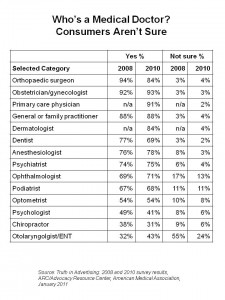 While 8 in 10 U.S. adults want a physician to have primary responsibility for the diagnosis and management of their health care, many people are not sure who’s a medical doctor. Surprisingly numbers of health consumers don’t think that orthopaedic surgeons, family practitioners, dermatologists, psychiatrists, and ophthalmologists are MDs.
While 8 in 10 U.S. adults want a physician to have primary responsibility for the diagnosis and management of their health care, many people are not sure who’s a medical doctor. Surprisingly numbers of health consumers don’t think that orthopaedic surgeons, family practitioners, dermatologists, psychiatrists, and ophthalmologists are MDs.
The American Medical Association‘s survey, Truth in Advertising, published in January 2011, follows up the AMA’s 2008 survey which had similar results. Data based on consumers answering the question, “Is this person a medical doctor,” are organized in the chart.
90% of people say that a physician’s additional years of medical education and training are ‘vital’ to optimal patient care. At the same time, only 51% of people say it’s easy to identify who is a licensed medical doctor and who is not by reading what services they offer, their title and other licensing credentials in ads and marketing materials.
In a related story, my colleague and friend Michael Millenson wrote in Kaiser Health News today about “Fixing the Failure at Physician Compare.” Physician Compare is the Centers for Medicare and Medicaid Service’s (CMS’s) portal meant to assist the health citizens (whether enrolled in Medicare or not) in finding doctors in their local communities. Millenson writes,
“In reality, the site is confusing and unfriendly to consumers, painfully slow and, worst of all, factually unreliable. Put bluntly, the agency, whose leader famously called himself a ‘patient-centered … extremist’ in a 2009 Health Affairs article, has produced a consumer tool that practically shouts, ‘We couldn’t care less whether any consumer ever uses this.'”
The AMA survey was conducted in November 2010 among 850 adults.
Health Populi’s Hot Points: The AMA poll and Millenson’s analysis point to the desperate need for greater health literacy, transparency and useful, usable tools for health citizens for becoming more engaged and empowered in their health and health care choices. Most health citizens don’t aspire to be couch potatoes when it comes to tapping into health information: in fact a majority of U.S. adults who have a primary care doctor would like more comprehensive information about their doctors online, learned in a survey conducted in November 2010.
AHRQ is soliciting comments for the Agency’s project, Understanding Development Methods from Other Industries to Improve the Design of Consumer Health IT. This project will focus on consumer health information search and storage, and health monitoring. Health Populi readers involved in consumer-facing health IT innovation and design should tap into this site and get involved. As the Physician Compare early experiences point out, AHRQ — which is a ‘sister’ organization to CMS under the umbrella of the Department of Health and Human Services — can benefit from your input.




 I'm in amazing company here with other #digitalhealth innovators, thinkers and doers. Thank you to Cristian Cortez Fernandez and Zallud for this recognition; I'm grateful.
I'm in amazing company here with other #digitalhealth innovators, thinkers and doers. Thank you to Cristian Cortez Fernandez and Zallud for this recognition; I'm grateful. Jane was named as a member of the AHIP 2024 Advisory Board, joining some valued colleagues to prepare for the challenges and opportunities facing health plans, systems, and other industry stakeholders.
Jane was named as a member of the AHIP 2024 Advisory Board, joining some valued colleagues to prepare for the challenges and opportunities facing health plans, systems, and other industry stakeholders.  Join Jane at AHIP's annual meeting in Las Vegas: I'll be speaking, moderating a panel, and providing thought leadership on health consumers and bolstering equity, empowerment, and self-care.
Join Jane at AHIP's annual meeting in Las Vegas: I'll be speaking, moderating a panel, and providing thought leadership on health consumers and bolstering equity, empowerment, and self-care.